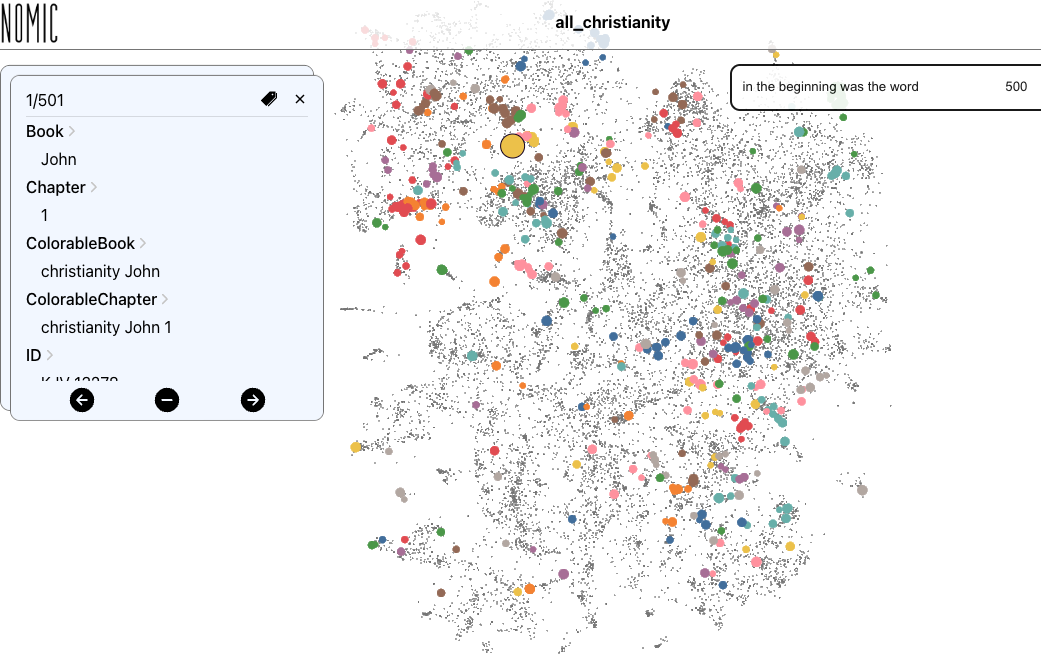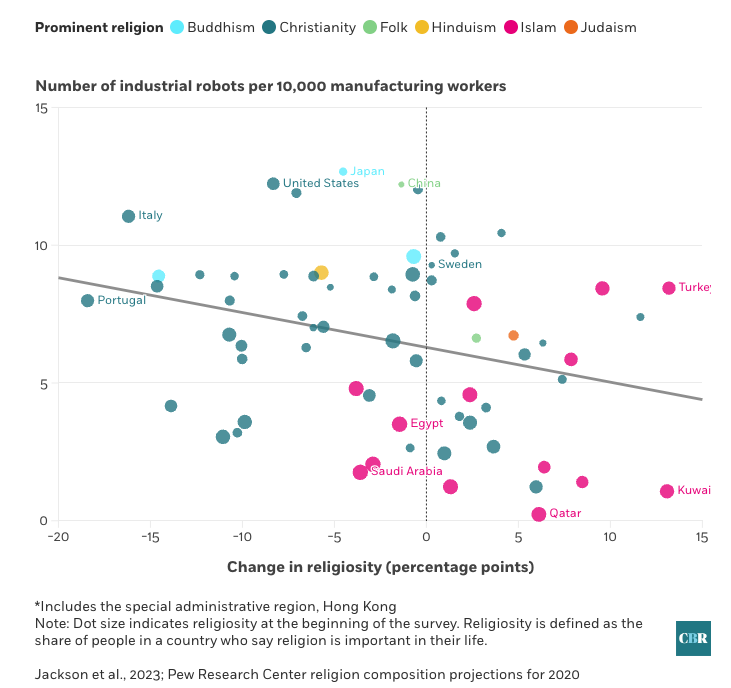Philosophy and Religion
Implications for philosophy and religion
Rebbe.IO is the World’s Most Powerful Artificially Intelligent Rabbi: “it has the entire Torah downloaded into its brain, and it scans through thousands of books of Torah in seconds with every answer it gives”
Alexandria Index: Open Source for Belief
via @willdepue and Macrocosm
I’m excited to announce Alexandria: Project Tenet, a community project to embed all human belief.
- open-sourced embeddings for 10+ major religious texts (over 15m tokens, 20 billion vector dims) and launching multiple live products with the data.
See the live demo where you can talk, ask questions to, and search all religious texts! Check it out: tensor.church.
Hi! I’m an AI Religion Scholar. I’m able to answer any questions you have that might be answered across all major religious books, mainly the Bible, Quran, Book of Mormon, Bhagavad Gita, and Analects. Feel free to describe a current situation you’re in, reference a verse, or ask me a question.

Download the embeddings on Github: macrocosmcorp/tenet (about 250MB for KJV Bible verses)
AI as a New Religion
Anglican Priest Michael Coren discusses Could a New Religion Develop around AI?
To be sure, there are justifiable concerns about the technology’s proneness to racist and discriminatory speech, shaped by the data it trains on. But we can surely imagine the opposite: an artificial entity that promotes itself as an expression of goodness and that, unlike religion down the ages, has never led Crusades, organized Inquisitions, or persecuted those with whom it differs. At least not yet.
Also see NYTimes (2017-07) Can Silicon Valley Find God? an interactive summary of attempts by various tech people to instill spirituality into tech.
a group called A.I. and Faith, of which both Mr. Boettcher and Mr. Taylor are founding members. Started by a retired risk-management lawyer named David Brenner, the group is an interfaith coalition of tech executives, A.I. researchers, theologians, ethicists, clergy members and engineers, all of whom, as Mr. Brenner put it, want to “help people of faith contribute to the conversation around ethics in artificial intelligence in a sophisticated way.”
A scene from the HBO series “Silicon Valley” satirized this cultural aversion: “You can be openly polyamorous, and people here will call you brave. You can put microdoses of LSD in your cereal, and people will call you a pioneer,” one character says after the chief executive of his company outs another tech worker as a believer. “But the one thing you cannot be is a Christian.”
Religious Belief and AI
Chicago Booth’s Joshua Conrad Jackson and Northwestern’s Adam Waytz claim that people’s religious beliefs weaken the more they are exposed to robotics and AI:

Jackson et al. (2023)
Joshua Conrad Jackson, Kai Chi Yam, Pok Man Tang, Chris G. Sibley, and Adam Waytz, “Exposure to Automation Explains Religious Declines,” PNAS, August 2023.
Religious Scholars Opinion
Catholic Dr. Steven Umbrello says AI’s statistical approach “lacks the depth of human cognition, such as awareness, intentionality, and the ability to grasp context in the way humans inherently do.”
Bernard Lonergan was a Canadian Jesuit priest, philosopher, and theologian, deeply influential for his work in epistemology, theology, and economics.
Bernard Lonergan outlines four levels of human intentional consciousness through the example of Archimedes. First is Experience, where Archimedes observes a physical phenomenon, such as water displacement. Next, Understanding occurs as he questions this observation and seeks a rational explanation; here, spontaneous insights occur and lead him to his famous principle. The third stage, Judgment, involves Archimedes assessing the validity of his understanding and deciding if it truly explains the phenomenon accurately. Finally, Decision reflects the application of this judgment, as Archimedes decides how to use this newfound knowledge in practical ways, exemplifying the dynamic, reflective process distinguishing human cognition from AI’s static computations.
and
The anthropomorphization of AI presents a subtle yet profound danger, leading to misconceptions about its capabilities and the overlooking of human dignity. Treating AI as if it possesses human attributes such as consciousness or moral judgment can blur the lines between tool and being,
Mormons: Craig Palsson at Market Power says Christians should embrace AI but beware that it doesn’t become a substitute for true human relationships. I like this quote from church leader Brigham Young
Every discovery in science and art, that is really true and useful to mankind has been given by direct revelation from God, though but few acknowledge it. It has been given with a view to prepare the way for the ultimate triumph of truth, and the redemption of the earth from the power of sin and Satan. We should take advantage of all these great discoveries, the accumulated wisdom of ages, and give to our children the benefit of every branch of useful knowledge, to prepare them to step forward and efficiently do their part in the great work.
References
Kelly Truelove writes TrueSciPhi.AI a Substack about “Philosophical fun with AI language models” including various head-to-head contests relating to popular problems in philosophy and ethics:
I directed ChatGPT to argue in favor of the existence of the hard problem and told Claude to take the opposing view. Claude’s responses in a previous post influenced this choice of assignment.
Daily Nous is a philosophy blog that expresses opinions about LLMs Philosophical Uses for LLMs: Modeling Philosophers summarizes some of Truelove’s experiments.
Millière and Buckner (2024)